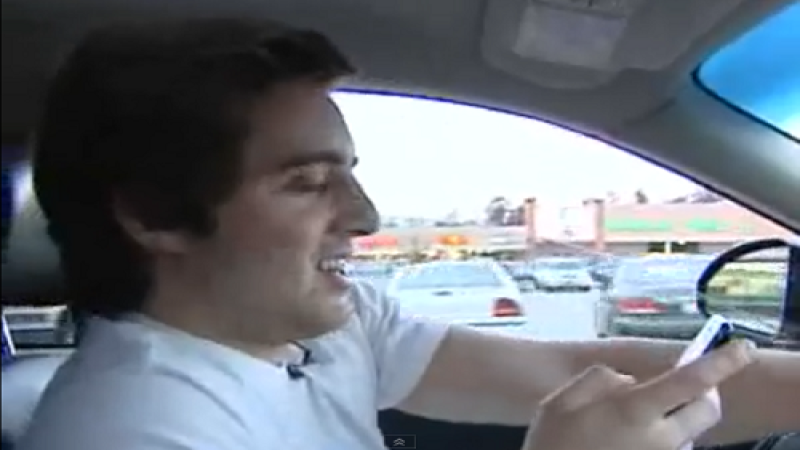Torque News recently published a news story, with accurate sources cited, regarding the fact that as cell phones and related devices were introduced, then became widespread, then ubiquitous, the death rate on America’s roads dropped in very close correlation. Interestingly, many readers who responded to the story on TN, and those who saw it on links with chat boxes, assumed that meant the author thought that cell phone call and texting in cars wasn’t a problem. Nothing could be further from the truth.
In America when a person is killed in a car crash there is always an investigation. Each accident is carefully reconstructed and studied. When blame can be clearly assessed by the investigating officers, it is. When it cannot be clearly assessed they either make a judgment call or fall back on the defaults of speed, weather related accident, or driver error. Without repeating the Torque News story, a third of all accidents are primarily caused by a driver being drunk. Another third are categorized as speed related. Watch the nightly news and see the destruction caused by a speeding car and you will see what the officers mean by “speed related.” They are not talking about 36 in a 35 zone. Thus we know that two-thirds of all fatal accidents are caused by two main factors unrelated to cell phones. Looking at the reports from IIHS and NHTSA we see that cell phone and texting related automobile deaths fall under the heading of “Distracted driving.” That entire segment of the reporting is about 10% of all deaths. Therefore, cell phones (mobile devices etc.) cannot possibly be implicated in more than that. In fact they likely (here is the opinion part) account for about 1 or 2 % of fatal car accidents. Each one is a tragedy. However, if we reduced drunk driving accidents by just a little bit we would save more lives than all of those killed in cell phone and texting related crashes.
That said, America needs to wake up and get back to having some self-respect and respect for others. In this story I won’t pick on teens at all. Let’s leave them out of it. In my opinion (this being an opinion story) laws and lectures and scared-straight sessions with them standing in front of wrecks won’t help change their minds. The reason is that it doesn’t actually apply to them. Because they are different, immortal in fact. However, shouldn’t we be able to change the actions of responsible moms, and businessmen-fathers?
At a supermarket this very week I was waiting to walk into the store at a cross walk. I always park at the back, away from the carriages and cars and walk to the store. This serves the dual purposes of giving me exercise and keeping my cars relatively safe from door dings and carriage smashes. As I stood there in the sun a woman in a Range Rover went past me, missing me by inches looking at personal mobile device (who knows if she was using it as a phone). She had one hand on the wheel, her head down and was holding the device in the other hand and touching it with her thumb as she went past me. Setting aside the fact that I was in a cross walk and it is illegal in Massachusetts to not stop for a waiting pedestrian (and there is a sign in the middle of the road there saying exactly that) and also setting aside whether or not this was unsafe, I ask this question; Why do people get into cars that are in parking lots, safely parked, then start out of those spaces and use a hand-held device? Can we not change that behavior? Could the person not simply stay safely in the space and text away as long as they like? Or maybe just wait on the task they want to perform and do it at home? Why start out and at the same time be texting?
Here is another behavior I witnessed that I think we have some hope of changing. A mother in my town I know well, and who I have a high degree of respect for as a mother, drove past me on the way to the kid’s bus stop in her new SUV. As she went by I could see she had a phone to her ear and that it was a smart phone. I love her new SUV and I am jealous. I would like one just like it, mine being 7 years old. I know the model and trim level of her SUV, and I know it comes standard with Bluetooth. At the bus stop I mentioned to her that I would be happy to pair her device to the SUV so she could talk hands free. Her reply floored me. She said that her kids don’t like to hear her phone conversations because it interrupts their music on the same speakers (the phone mutes the music). So she disabled the hands-free features and she just dials by hand and talks with the phone to her ear while she drives her children around. In the interest of saving my typing fingers I will not even suggest how this behavior might be modified.
I won’t let the dads off the hook in this rant. About 3 years ago I was a passenger in a car with a businessman I know and respect. He had a Bluetooth phone and an earpiece it was paired to. He was also careful and would never make any outgoing calls when driving, but he did need to take calls. This is more than most on the road salesman do to be safe and courteous in my experience. While we drove a call came in. We were on a freeway almost alone, zero traffic. He tapped the earpiece and started to talk. He then took a pen from his shirt pocket and started writing on his note pad balanced on his lap. He was doing this without looking at the pad. Eyes on the road. As he drove looking straight ahead he started to drift to the right, toward the “break-down lane” as we call here in Mass. Then he looked down for just an instant to see the pad and we were going to hit a guard rail where it started. I gently and slowly reached over and nudged the wheel and the car went back onto the lane. He said into the ear-thingy’s microphone “Thank you, I have to call you back.” And he tapped the phone and hung up. He apologized to me and said “I had to take that call.”
If we are going to try to make the roads safer I say we focus on the drunks. If we decide not to, and we want to focus on the 2% of accidents instead of the 33%, can we at least start with the people that might listen to reason?
Photo courtesy of Youtube.com and WXIItv
Set as google preferred source











